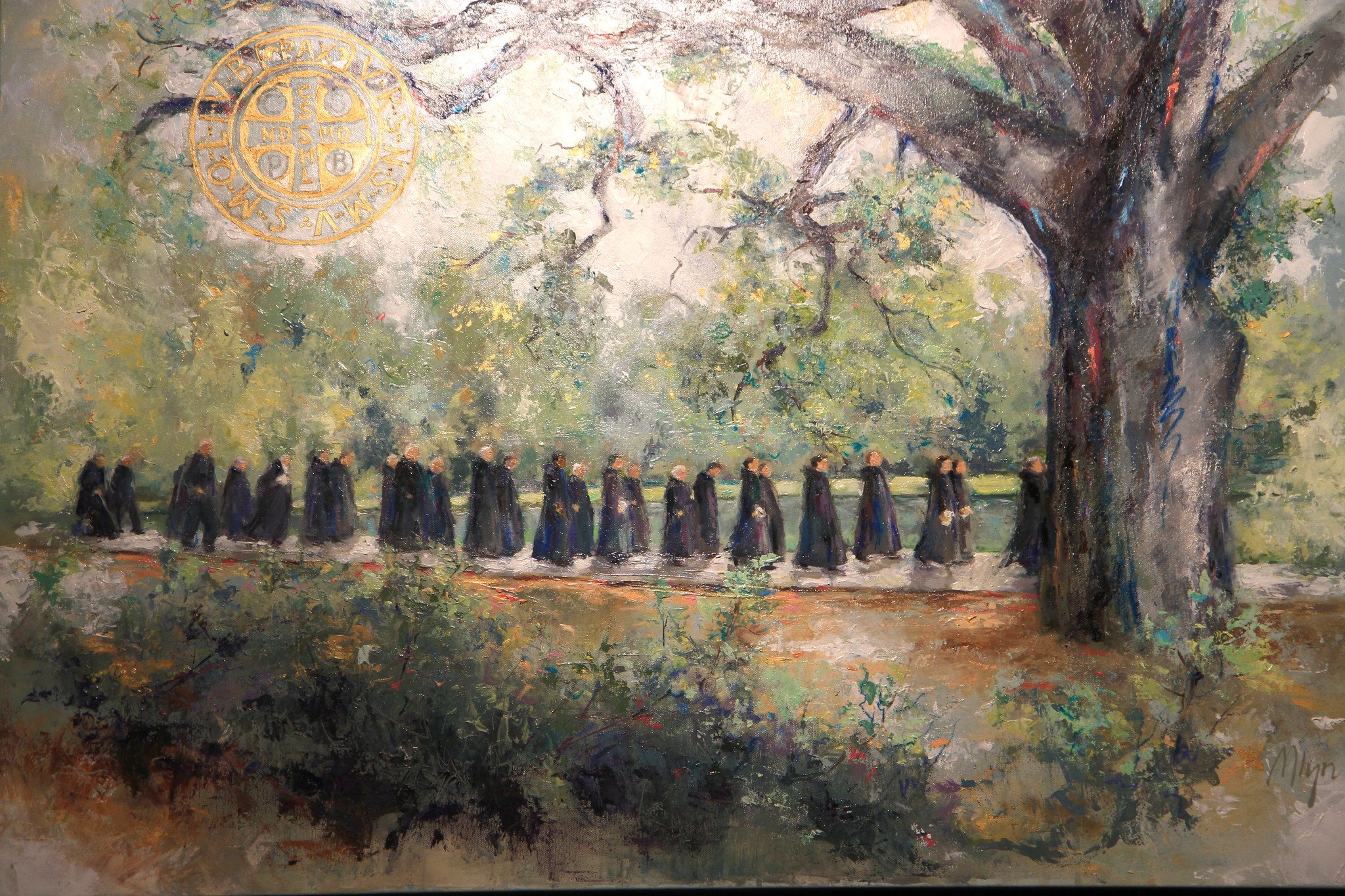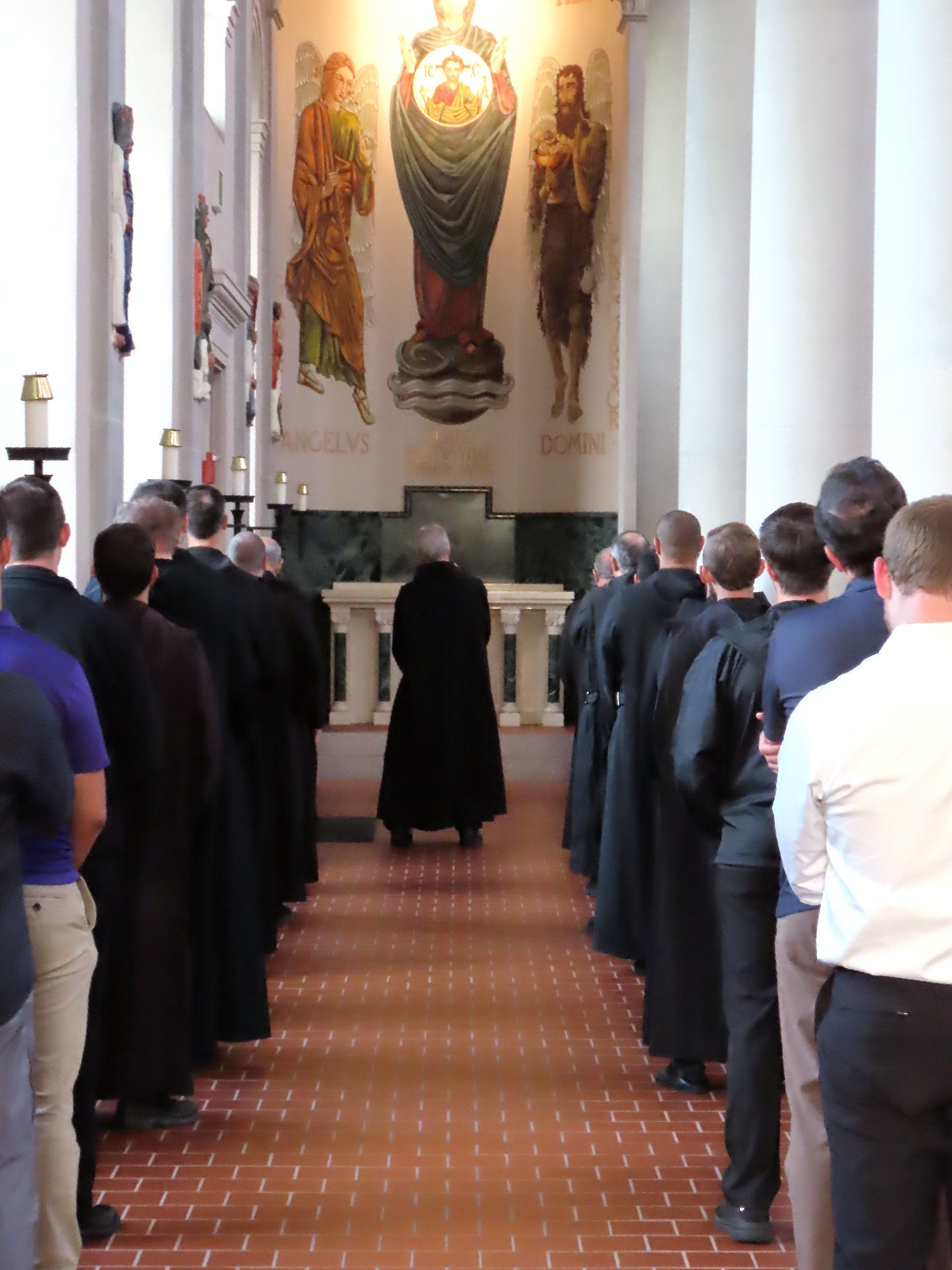
BECOMING A MONK
“Listen carefully, my children, to the master’s instructions, and attend to them with the ear of your heart.”
- Rule of Saint Benedict, Prologue

Is God Calling You to Become a Monk? Monastic Formation Is An In-Depth Process
Are you discerning a religious vocation and wondering if you might be called to be a monk, specifically a Benedictine monk at Saint Joseph Abbey?
Becoming a monk is a continuing process of listening and responding to God's Call to Holiness. There are several stages of monastic formation. It is an in-depth, lengthy process that gives you time to immerse yourself into the community and be certain this is the place for you.
For men between the ages of 21 and 45 who feel they may be called to monastic life, the first step is to meet with the vocation director. If the vocation director and the individual discern a possible vocation, the vocation director will arrange a brief stay in the monastery for the applicant. During this stay, the individual will be introduced to the monastic community and participate in the life of the community (prayer, work, meals, recreation).
If the applicant wishes to pursue a monastic life here, he then arranges for a longer stay at the Abbey. During this time, he will meet with the abbot and formation director. After these meetings, the abbot and director will decide if he should begin the formal application process. The vocation director will then guide him through this process, which includes submitting the application form and letters of recommendation. Health, eye, and dental exams as well as a psychological evaluation are required.
After a number of visits and after the application process is complete, he may petition to enter the community. Upon acceptance, the formation process begins.
POSTULANCY
Postulancy is a time of more intense vocational discernment where the postulant spends a number of months becoming more deeply acquainted with the daily rhythm of monastic life by living in the monastery, sharing in the prayer and work of the monks, and taking classes on monastic practices with the formation director. If the postulant would like to continue, he can petition to enter the novitiate.
NOVITIATE
The character of the year of novitiate is marked by a separation from the world and an acclimation to one's new life in the monastery. During this year, the novice studies the Rule of St. Benedict, Sacred Scripture, and monastic history and is engaged in a variety of work around the monastery. The novice takes classes in monastic history and spirituality and contributes to the life of the community in prayer and work. After a year in the novitiate, the novice may petition to make his first profession.
TEMPORARY VOWS
When the monk professes his temporary vows he is given a new name, signifying the beginning of a new life to which the Lord has called him, and he promises stability, obedience, and conversion to a monastic way of life for three years. The years of temporary profession for the “junior” monk are a time for further study and absorption of the monastic way of living the Gospel and a deeper integration into the community. After three years, he may petition to profess his solemn vows, or he may extend his temporary vows annually up to six years.
SOLEMN VOWS
After at least three and no more than nine years of temporary vows, the young professed monk may profess his solemn, or final vows, which are taken for life. Solemn profession of the Benedictine vows of stability, obedience, and conversion to a monastic way of life is a commitment to faithfully live as a monk until death.
Stability: By the vow of stability, the monk commits himself to remaining in the monastery where he professes vows until death. This binds the monk both to the community itself and to monastic life in that particular community. Stability fosters his abiding love of Christ as he lives out his days within the concrete circumstances of this particular monastic family.
Conversion of Life: By the vow of conversion of life (conversatio morum), the monk commits himself to the ascetical labor of sharing Christ's passion by dying to sin and choosing that which leads to the life and freedom of the resurrection. This paschal character of the monastic way of life shines forth in the monk's following of Christ through his poverty and celibate love.
Obedience: Christ, following the will of his Father, laid down his life for all and opened for the future the hope of resurrection. Through his listening for and heeding God's will as it comes to him both through the abbot and in the needs of his brothers, the monk seeks to express through his life that Christ is his Lord and King. In this spirit, the monk vows to obey his superiors, in accordance with the Rule of Saint Benedict and the Constitutions of the congregation to which the community belongs.













